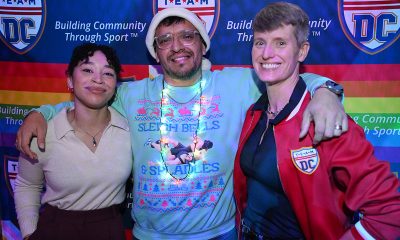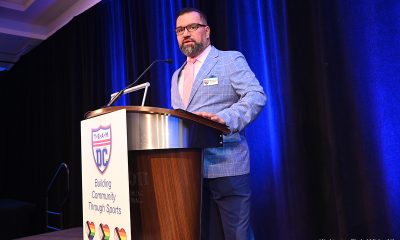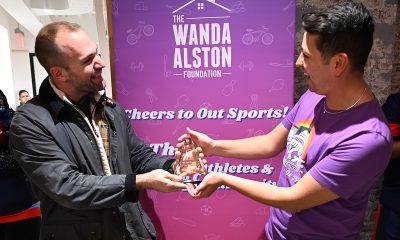Living
Take me out to the ball game
Thousands expected for Gay Softball World Series
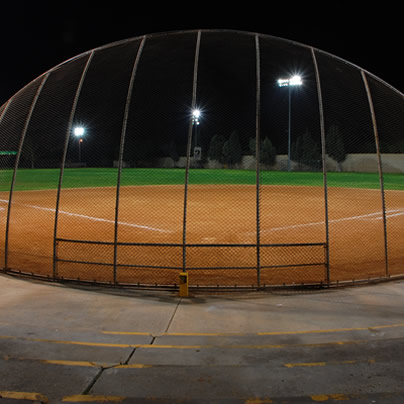
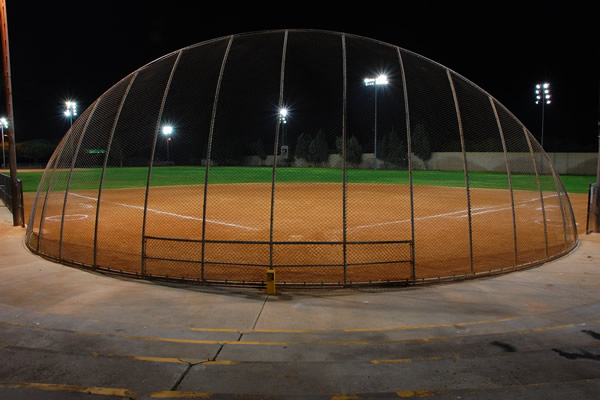
Thousands are expected to come to the D.C. area for the Gay Softball World Series. (Photo by Bigstock)
The annual Gay Softball World Series, organized by the North American Gay Amateur Athletic Alliance, is returning to D.C. after 10 years and is expected to be the biggest tournament the organization has ever hosted. The opening ceremonies begin Monday with the tournament to be held Tuesday through Saturday.
“We have over 156 teams confirmed and it will be the largest World Series ever,” says Wayne Williams, co-director of this year’s tournament. “We’ve had tremendous support from the LGBT community and the city itself. The city’s been our partner from the beginning.”
Gay softball teams from all over the U.S. and Canada participate in the Alliance’s Gay Softball World Series each year. The games are free to attend and this year’s expected turnout is between 3,500-4,000 spectators and participants. The Alliance is technically a co-ed organization, but the majority of its teams are all male.
Teams compete in five different divisions, including A, B, C, D and Masters, which is reserved for players 50 and older. Many local Alliance leagues have tournaments to decide which teams will go to the World Series and which division they will compete in.
“The age range varies. You have to be 18 and over to play, and there is no upper age limit,” Williams says. “The Master’s division has been growing each year because a lot of the players are aging.”
Games will be held in a variety of locations outside the city including Watkins Regional Park (301 Watkins Park Dr., Upper Marlboro, Md.), Braddock Park (13241 Braddock Rd., Clinton, Va.), Fairland Regional Park (13950 Old Gunpowder Rd., Laurel, Md.) and Bachman Sports Complex (570 East Ordnance Rd., Glen Burnie, Md.). The exact game times and who will be playing who are still to be announced. The Alliance will not provide buses or vans to the fields for teams or spectators.
“We don’t provide transportation to and from the fields,” Williams says. “We do have an arrangement with the National Car Rental company. They provide discounts for car rentals, so we will connect our players with that service.”
Although the games are free to watch, the Alliance does raise money each year for charity from the teams that pay to compete in the World Series and the week’s social events. The beneficiaries are usually LGBT organizations. This year’s are the You Can Play Project (an LGBT organization that combats discrimination in athletics), Team D.C. and the Team D.C. Student-Athlete Scholarship Fund, the Ben Cohen StandUp Foundation (anti-bullying) and PETS-Washington, D.C. (provides care for pets owned by those living with HIV/AIDS). The Alliance is a registered non-profit with a charitable mission.
“Softball is an opportunity for players to come together as a group and organize activities in that regard, to represent the best of gay softball,” Williams says. “We designate local and national charities for this, so it’s an opportunity to give back.”
The week’s social events include daily afternoon pool parties, Night OUT at the Nationals hosted by Team D.C., an Alliance talent show and a “GrandSlam” after party at Town (2009 8th St., N.W.) on Saturday night. Many of the players and spectators enjoy the sense of community that is a part of each year’s tournament.
“I absolutely love the gay softball community,” says Tony Mase, shortstop for Washington-based team Capital Punishment. “There’s just something about the camaraderie among the teams that play in the league that you don’t get playing in other leagues outside of that community. For instance, our teams play in a straight league on Friday nights, and it’s not that bad to play in it, but it’s just not as fun and outgoing as it is in the LGBT league.”
This year’s World Series will demonstrate the cohesion among D.C.’s gay softball community. Six D.C. teams are competing, which is more than ever before. Ed Vincent, the coach of the Logan Tavern team and co-director for the tournament, describes the World Series as important.
“[The Alliance] provides this opportunity as kind of a safe haven for the LGBT community to play in an organized league setting,” Vincent says. “It’s really important that the players feel comfortable and secure to play in a league where they can compete at all levels, whether it’s the A division that’s the best or the B division that’s more recreational.”
“The tournament really allows the softball players to be role models for LGBT youth and other LGBT people out there. There’s a way to get involved and a way to form an association and a network of friends. It’s almost like a family,” Williams says. “A lot of these people really know each other. It’s a way to help people come out, or feel more comfortable with the coming out process.”
For more information on the 2013 Gay Softball World Series, visit DCseries2013.com.
Events:
MONDAY
Opening Ceremonies are from 6-10 p.m. at Fairgrounds D.C. (1299 Half St., S.E.), and the Opening Ceremonies After-Party is from 9 p.m.-2 a.m. at Ziegfeld’s Secrets (1824 Half St., S.E.). A complimentary shuttle-bus service will loop from Fairgrounds to the after-party at 9, and will drop guests off at the Navy Yard-Ballpark Metro Station until 11.
TUESDAY
The tournament kicks off at 7:50 a.m. at the various fields and the day’s games finish at 5 p.m.
An afternoon pool party for players will be held at Penthouse Pool at VIDA Fitness (1612 U St., N.W.) from noon-6 p.m.
Team D.C. hosts Night OUT at the Nationals at Nationals Park (1500 South Capitol St., S.E.) for tournament contestants. Gates open at 4:30 p.m. with $5 beer in the Night OUT section until first pitch at 7:05 p.m.
WEDNESDAY
Tournament games will be held from 7:50 a.m.-8 p.m. at the various fields, with an afternoon pool party at VIDA Fitness (1612 U St., N.W.) from noon-6 p.m.
Sequioa Restaurant (3000 K St., N.W.) hosts a “Hall of Fame Reception and Dinner” from 7:30-10:30 p.m.
THURSDAY
Tournament games will be held from 7:50 a.m.-6 p.m. at the various fields, with an afternoon pool party from noon-6 p.m. at VIDA Fitness (1612 U St., N.W.).
The Renaissance Hotel Grand Ballroom hosts an Association talent show from 8-11 p.m, with performances by players, coaches and directors. Shi-Queeta-Lee and Bubba D. Licious will be emceeing the event. Admission is $5. For more information and to purchase tickets, visit nagaaatalentshow.eventbrite.com.
FRIDAY
Tournament games will be held from 7:50 a.m.-6 p.m. at the various fields, with an afternoon pool party from noon-6 p.m. at VIDA Fitness (1612 U St., N.W.).
SATURDAY
The NAGAAA Softball Championships will be held from 8 a.m.-4 p.m. at Fairland Regional Park and Watkins Regional Park, with a closing street party and awards ceremony at the Renaissance Hotel’s 8th St. Plaza (999 9th St., N.W.).
Town (2009 8th St., N.W.) hosts the GrandSlam Closing Dance Party from 10 p.m.-3 a.m., with free admission for those with World Series wristbands from 10-11 p.m, and $8 after 11.
Real Estate
Unconventional homes becoming more popular
HGTV show shines spotlight on alternatives to cookie cutter
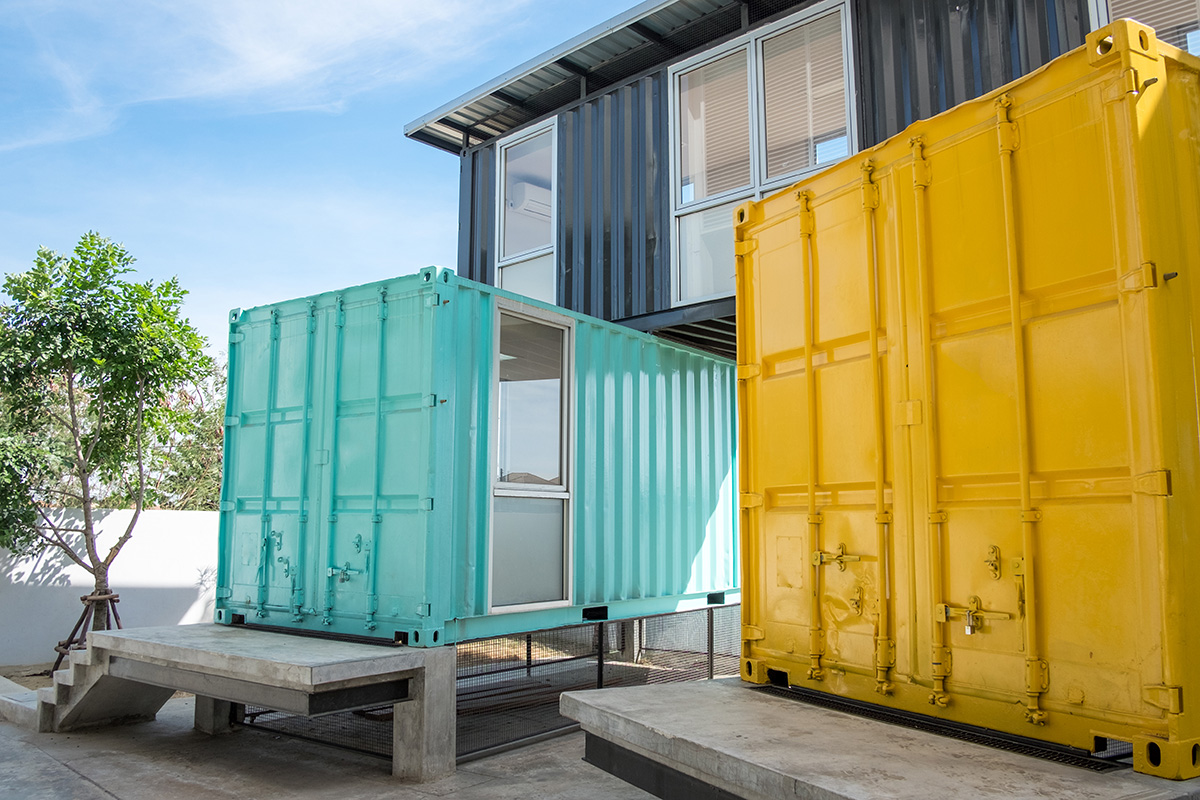
While stuck in the house surrounded by snow and ice, I developed a new guilty pleasure: watching “Ugliest House in America” on HGTV. For several hours a day, I looked at other people’s unfortunate houses. Some were victims of multiple additions, some took on the worst décor of the ‘70s, and one was even built in the shape of a boat.
In today’s world, the idea of what a house should look like has shifted dramatically. Gone are the days of cookie-cutter suburban homes with white picket fences. Instead, a new wave of architects, designers, and homeowners are pushing the boundaries of traditional housing to create unconventional and innovative spaces that challenge our perceptions of what a home can be.
One of the most popular forms of alternative housing is the tiny house. These pint-sized dwellings are typically fewer than 500 square feet and often are set on trailers to allow for mobility. Vans and buses can also be reconfigured as tiny homes for the vagabonds among us.
These small wonders offer an affordable and sustainable living option for those wishing to downsize and minimize their environmental footprint. With clever storage solutions, multipurpose furniture, and innovative design features, tiny homes have become a creative and functional housing solution for many, although my dogs draw the line at climbing Jacob’s Ladder-type steps.
Another unusual type of housing gaining popularity is the shipping container home. Made from repurposed shipping containers, these homes offer a cost-effective and environmentally friendly way to create modern and sleek living spaces. With their industrial aesthetic and modular design, shipping container homes are a versatile option for those contemplating building a unique and often multi-level home.
For those looking to connect with nature, treehouses are a whimsical and eccentric housing option. Nestled high up in the trees, these homes offer a sense of seclusion and tranquility that is hard to find in traditional housing. With their distinctive architecture and stunning views, treehouses can be a magical retreat for those seeking a closer connection to the natural world.
For a truly off-the-grid living experience, consider an Earthship home. These self-sustaining homes use recycled construction materials and rely on renewable energy sources like solar power and rainwater harvesting. With their passive solar design and natural ventilation systems, Earthship homes are a model of environmentally friendly living.
For those with a taste for the bizarre, consider a converted silo home. These cylindrical structures provide an atypical canvas for architects and designers to create modern and minimalist living spaces. With curved walls and soaring ceilings, silo homes offer a one-of-a-kind living experience that is sure to leave an impression.
Barn homes have gained popularity in recent years. These dwellings take the rustic charm of a traditional barn and transform it into a modern and stylish living space. With their open, flexible floor plans, lofty ceilings, and exposed wooden beams, barn homes offer a blend of traditional and contemporary design elements that create a warm and inviting atmosphere, while being tailored to the needs and preferences of the homeowner.
In addition to their unique character, barn homes also offer a sense of history and charm that is hard to find in traditional housing. Many of them have a rich and storied past, with some dating back decades or even centuries.
If you relish life on the high seas (or at a marina on the bay), consider a floating home. These aquatic abodes differ from houseboats in that they remain on the dock rather than traverse the waterways. While most popular on the West Coast (remember “Sleepless in Seattle”?), you sometimes see them in Florida, with a few rentals available in Baltimore’s Inner Harbor and infrequent sales at our own D.C. Wharf. Along with the sense of community found in marinas, floating homes offer a peaceful retreat from the hustle and bustle of city life.
From tiny homes on wheels to treehouses in the sky or homes that float, these distinctive dwellings offer a fresh perspective on how we live and modify traditional thoughts on what a house should be. Sadly, most of these homes rely on appropriate zoning for building and placement, which can limit their use in urban or suburban areas.
Nonetheless, whether you’re looking for a sustainable and eco-friendly living option or a whimsical retreat, there is sure to be an unconventional housing option that speaks to your sense of adventure and creativity. So, why settle for a run-of-the-mill ranch or a typical townhouse when you can live in a unique and intriguing space that reflects your personality and lifestyle?
Valerie M. Blake is a licensed Associate Broker in D.C., Maryland, and Virginia with RLAH @properties. Call or text her at 202-246-8602, email her at [email protected] or follow her on Facebook at TheRealst8ofAffairs.
Real Estate
Convert rent check into an automatic investment, Marjorie!
Basic math shows benefits of owning vs. renting
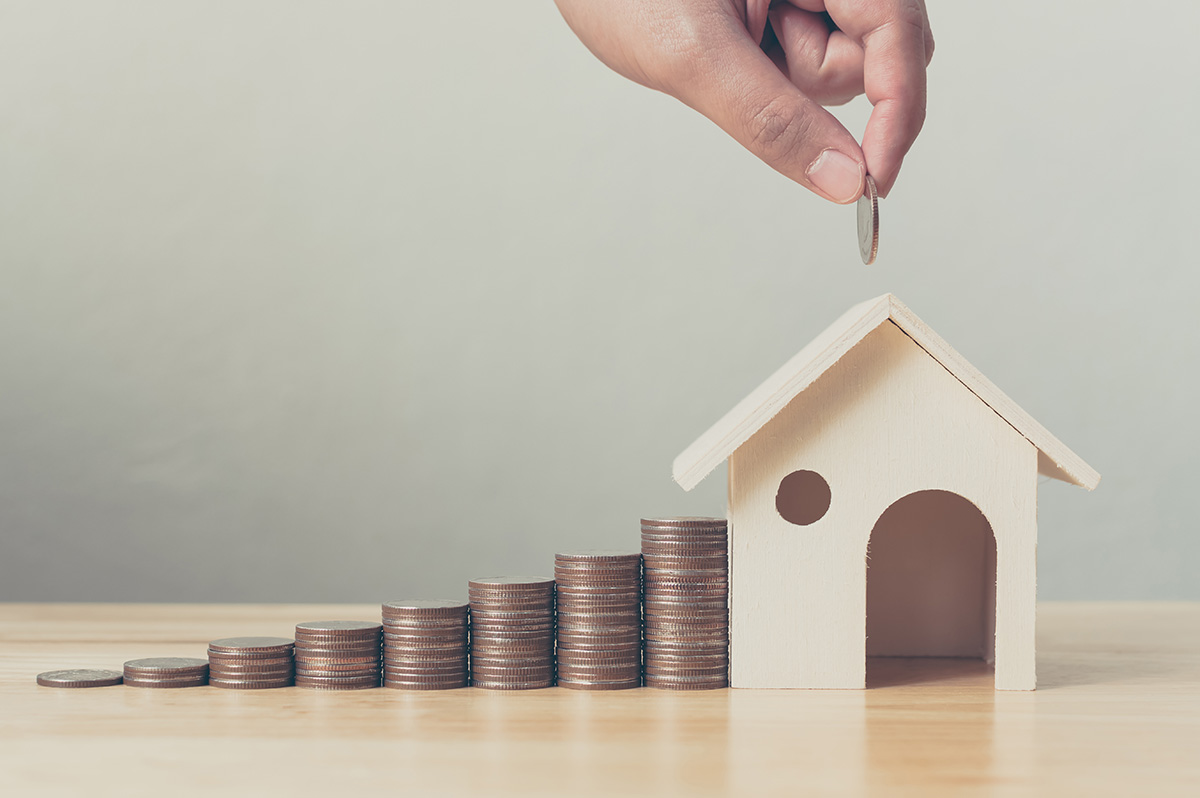
Suppose people go out for dinner and everyone is talking about how they are investing their money. Some are having fun with a few new apps they downloaded – where one can round up purchases and then bundle that money into a weekly or monthly investment that grows over time, which is a smart thing to do. The more automatic one can make the investments, the less is required to “think about it” and the more it just happens. It becomes a habit and a habit becomes a reward over time.
Another habit one can get into is just making that rent check an investment. One must live somewhere, correct? And in many larger U.S. cities like New York, Chicago, D.C., Los Angeles, Miami, Charlotte, Atlanta, Dallas, Nashville, Austin, or even most mid-market cities, rents can creep up towards $2,000 a month (or more) with ease.
Well, do the math. At $2,000 per month over one year, that’s $24,000. If someone stays in that apartment (with no rent increases) for even three years, that amount triples to $72,000. According to Rentcafe.com, the average rent in the United States at the end of 2025 was around $1,700 a month. Even that amount of rent can total between $60,000 and $80,000 over 3-4 years.
What if that money was going into an investment each month? Now, yes, the argument is that most mortgage payments, in the early years, are more toward the interest than the principal. However, at least a portion of each payment is going toward the principal.
What about closing costs and then selling costs? If a home is owned for three years, and then one pays out of pocket to close on that home (usually around 2-3% of the sales price), does owning it for even three years make it worth it? It could be argued that owning that home for only three years is not enough time to recoup the costs of mostly paying the interest plus paying the closing costs.
Let’s look at some math:
A $300,000 condo – at 3% is $9,000 for closing costs.
One can also put as little as 3 or 3.5% down on a home – so that is also around $9,000.
If a buyer uses D.C. Opens Doors or a similar program – a down payment can be provided and paid back later when the property is sold so that takes care of some of the upfront costs. Knowledgeable lenders can often discuss other useful down payment assistance programs to help a buyer “find the money.”
Another useful tactic many agents use is to ask for a credit from the seller. If a property has sat on the market for weeks, the seller may be willing to give a closing cost credit. That amount can vary. New construction sellers may also offer these closing cost credits as well.
And that, Marjorie, just so you will know, and your children will someday know, is THE NIGHT THE RENT CHECK WENT INTO AN INVESTMENT ACCOUNT ON GEORGIA AVENUE!
Joseph Hudson is a referral agent with Metro Referrals. Reach him at 703-587-0597 or [email protected].

Some vehicles age quietly — but not muscle cars.
For 2026, the Chevrolet Corvette tightens its focus, fixes one glaring flaw (the previously dowdy interior) and flaunts a futuristic design. The Dodge Charger, on the other hand, is loud and proud, daring you to ignore its presence at your peril.
CHEVROLET CORVETTE
$73,000-$92,000
MPG: 16 city/25 highway
0 to 60 mph: 2.8 seconds
Cargo space: 13 cu. ft.
PROS: Awesome acceleration. Race-car feel. Snazzy cabin.
CONS: No manual transmission. No rear seat. Tight storage.
Finally, the Chevrolet Corvette feels as good inside as it looks flying past you on the freeway. That’s thanks to the classy, completely redesigned cabin. Gone is the old, polarizing wall of buttons in favor of a sleeker, three-screen cockpit. There’s a large digital gauge cluster, a wide infotainment screen angled toward the driver, and a marvy new auxiliary display. Everything is modern and a bit glitzy — but in a good way.
Fit and finish are higher quality than before, and the controls are more intuitive. Chevy’s Performance App is now standard across trims, offering real-time data for drivers who enjoy metrics as much as momentum. And the new interior color schemes, including slick asymmetrical options, let you express yourself without screaming for attention—confidence, not obnoxious bluster.
As for handling, the steering is quick and sure, body control is exceptional, and acceleration is blazingly fast. A mid-engine layout also delivers sublime balance.
Three trim options, including the V8-powered Stingray, the E-Ray (also with a V8 but paired with electric all-wheel drive), and the Z06 and ZR1 variants for racing devotees.
(Note to self: For a truly mind-blowing experience, there’s the new 1,250-horsepower ZR1X all-electric supercar that goes from 0 to 60 mph in less that 2 seconds and is priced starting at $208,000.)
Yes, the ride in any of these Corvettes can be firm. And visibility is, well, rather compromised. But this supercar is a total Dom, not a timid sub. Think Alexander Skarsgard in “Pillion,” and you get the picture.
DODGE CHARGER

$52,000-$65,000
MPG: 16 city/26 highway
0 to 60 mph: 3.9 seconds
Cargo capacity: 22.75 cu. ft.
PROS: Choice of gas or EV power. Modern tech. Spacious cabin.
CONS: No V8 engine (yet). Soft steering. Less-than-lithe cornering.
Everything old is new again for the Dodge Charger. The automaker initially was phasing out gas-powered models in a shift to electric vehicles but then quickly pivoted back to include gas engines after yo-yo regulatory changes this year from, well, the yo-yos in the White House.
Powerful twin-turbo engines in the R/T and Scat Pack trims produce up to 550 horsepower. These models come standard with all-wheel drive but can be switched to rear-wheel drive for classic muscle-car antics when the mood strikes you.
At the same time, Dodge still offers the electric Charger Daytona, delivering up to 670 horsepower and ferocious straight-line acceleration.
The Charger’s aggressive design, massive digital displays and practical hatchback layout carry over, reinforcing its ability to be both a performance diva and everyday companion. With the larger-than-expected storage space, I appreciated being able to fit a boatload of groceries in the trunk during a Costco run.
New wheel designs, paint choices and trim variations help you visually distinguish between gas and electric Chargers. But no matter the model, each one feels decisive and deliberate on the road. Commuting in stop-and-go traffic during rush hour is fine, but this street machine excels at high-speed cruising on the freeway.
The turbo six-cylinder engine delivers muscular torque with less drama than the old V8s, but still with plenty of urgency. The electric Daytona version is a different kind of thrill, with its instant, silent thrust that feels like it could almost launch you to the moon.
Steering is stable but not exactly crisp, and the Charger’s weight makes it less lithe—and lively—than other muscle cars, especially when navigating tight corners.
But that’s just fine with me. Like Bea Arthur as Dorothy in “The Golden Girls,” this no-nonsense muscle car is proud to be big, bold and brassy.
-

 Virginia5 days ago
Virginia5 days agoHashmi speaks at Equality Virginia Lobby Day
-

 District of Columbia5 days ago
District of Columbia5 days agoNorton hailed as champion of LGBTQ rights
-

 District of Columbia4 days ago
District of Columbia4 days agoD.C. Council gives first approval to amended PrEP insurance bill
-

 Maryland5 days ago
Maryland5 days ago4th Circuit dismisses lawsuit against Montgomery County schools’ pronoun policy

